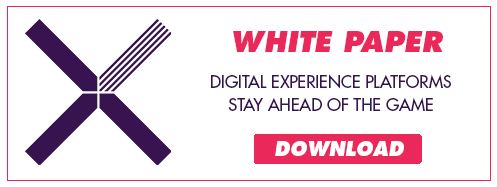
A DXP case study
A digital experience platform (DXP) provides you with a centralised repository that brings together various pieces of information from across your organization. This means you no longer have to spend time putting together data and sending it to other departments within your company.
As a result, you have more time to deal with strategic tasks related to running your business. Fayat, a leading French construction and public works company, provides a good example of the business benefits of a DXP. The company had been using a solution to manage its different construction projects for 15 years. However, the solution led to three major pain points:
- It couldn’t be deployed across the group
- It couldn’t internalise management of the construction sites
- It couldn’t offer access to partners and others
Fayat decided to start again from scratch but wanted to keep the functional scope they already had as a basis. They looked for a new solution that would provide flexibility in deployment on a global level, universal access and the integration of partners.
The solution
The company chose a modular solution, which evolves over time with new technologies, to manage its construction sites across the entire Group. This solution covers the following 3 processes:
- Purchasing
Among other things, this module enables the construction site manager to place an order, receive the various elements of the order and, finally, link the invoice to different ERP systems.
- Pay and employee time tracking
This part enables various experts involved in the construction site to clock in and out, providing managers with a report of all time spent working on the site. The solution thus enables Fayat to manage both people and material. All this data is then sent to various Information Systems (IS) related to the different areas of expertise. The time tracking data is input into the Human Resources system and is linked to what employees actually get paid. The information regarding materials is sent to another IS system that manages the material.
- Budget
This part of the solution helps those involved in handling budgets for construction sites. Managing the different projects for a site requires creating different categories of tasks to cover the work to be done, such as laying railway tracks or putting up fencing. A provisional budget is allocated to each task, enabling Project Managers to keep a close eye on the evolution of their budgets and control spending. Let’s say, for example, they have a certain number of kilometres of railway tracks to lay for a high-speed train.
And once they are a few months into the project, they realise that they are 10% over budget. This will force them to analyse the situation, understand why there is a difference and use this as an opportunity to make changes and improve profitability. The other parts of the DXP – purchasing and pay and time tracking – are linked to this part, so that different specialists from different areas of the construction site can understand the different types of costs involved in any project.
The results
This solution makes it much easier for Fayat to get an overview of the whole purchasing, time tracking and budgeting process, giving them the ability to centralise and handle information very quickly. Thanks to the DXP, Fayat’s time tracking process was able to move directly from paper to digital, improving overall efficiency. As Bruno Peytour, Programme Manager at Fayat IT, confirms:
“We used to spend up to 15 days processing time tracking data for wages. Thanks to the DXP, it now only takes us two days. No more.” Mr Peytour believes that: “In the construction industry, we need to be able to offer teams, and especially teams including millennials, a single tool that allows them to use, understand and enrich data. Our DXP does just this, enabling us to manage the operational reality of a construction site."
Check out our white paper to learn more!
